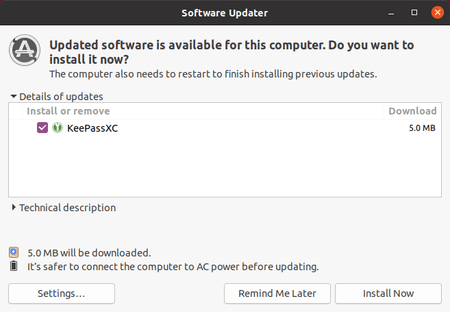

- KEEPASSXC APPLE SILICON DRIVERS
- KEEPASSXC APPLE SILICON PRO
- KEEPASSXC APPLE SILICON SOFTWARE
- KEEPASSXC APPLE SILICON FREE
KEEPASSXC APPLE SILICON FREE
UTM is an app with a free and paid (Mac App Store) version that allows you to emulate a large number of processor architectures. Use Linux via Virtualization TodayĮven though you can’t yet run Linux natively, you can still do so using a virtual machine (VM). If you’re interested you can support the Asahi Linux Project with a donation, or even dedicate your own time by contributing to the project directly. Remember that this project is run by extremely talented and dedicated enthusiasts who are working tirelessly on a passion project.

KEEPASSXC APPLE SILICON PRO
This could be great news for MacBook Pro owners who have the improved M1 Pro and M1 Max chips but either way, it seems like the Asahi Linux Project is committed to bringing Linux to as many Apple Silicon devices as possible.
KEEPASSXC APPLE SILICON DRIVERS
Apple’s M1 chip is the first target, but the Asahi Linux Project notes that “we are in a unique position to be able to try writing drivers that will not only work for the M1, but may work –unchanged– on future chips as well.”

In time, the Asahi Linux Project plans to release a version of Arch Linux ARM for anyone to try. So far there’s only an alpha installer available and it’s aimed squarely at developers. The post notes that while no GPU support has been added yet, “the M1’s CPUs are so powerful that a software-rendered desktop is actually faster on them” compared with comparable 64-bit ARM processors. The blog post details the progress made so far, where several key and low-level drivers have been merged into Linux kernel 5.16. One developer, Alyssa Rosenzweig, tweeted of her excitement:Įverything just happens… instantly? What?Ĭomputers haven't felt this fast since before I was born. The announcement was made in a blog post on the Asahi Linux blog. Apple computers that use the M1 chip are now usable as desktop Linux machines. In September 2021 the project reached an important milestone. The Asahi Linux Project is a collective effort to bring Linux to Apple’s new desktop platform. The road from basic kernel support to fully working desktop experience is a long one, but thanks to the efforts of some dedicated and skilled programmers, Linux on Apple Silicon is fast becoming a reality. These control all aspects of normal functionality: USB support, audio, power management, the ability to control CPU scaling, and more.

Getting the kernel working was an important early first step, but there are many more drivers that are needed to add support for the various controllers and chips that power Apple Silicon machines. Unsigned kernels are those that are not overseen by Apple.
KEEPASSXC APPLE SILICON SOFTWARE
It’s always there in the background, controlling how hardware and software communicate with one another. The kernel is a central component of an operating system. The good news is that Apple hasn’t blocked unsigned kernels from booting on Apple Silicon. There are already Linux distributions that are built for “true” ARM-based processors, but Apple Silicon is a different beast that requires a new approach. They underpin many of the advancements Apple has managed to squeeze into its latest Mac models, but this poses an issue for Linux support. In true Apple fashion, these differences are proprietary and heavily guarded. Since Apple Silicon is ARM– based, it borrows heavily from ARM but the software still needs to be adapted specifically for it. In doing so, they also removed the ability to run commonly available x86 operating systems. Apple made this switch for a range of reasons including big performance gains and a better performance-to-watt ratio.


 0 kommentar(er)
0 kommentar(er)
